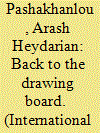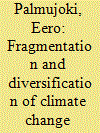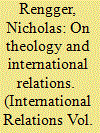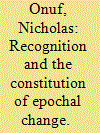| Srl | Item |
| 1 |
ID:
121860


|
|
|
|
|
| Publication |
2013.
|
| Summary/Abstract |
Offensive realism argues that states committed to survive are nevertheless condemned to participate in a relentless struggle for power, and it holds the structure of the international system as the cause of this tragic outcome. This article subjects the logic behind this tragic worldview and the explanatory power of offensive realism to a careful and comprehensive scrutiny. This in-depth analysis of offensive realism amounts to a substantial critique of the theory as it fails to logically generate the brutish world it presupposes and is plagued by significant shortcomings in its explanatory model. These findings suggest that offensive realism cannot provide useful theoretical lenses for explaining and understanding international politics, even when it is assessed on its own terms.
|
|
|
|
|
|
|
|
|
|
|
|
|
|
|
|
| 2 |
ID:
121859


|
|
|
|
|
| Publication |
2013.
|
| Summary/Abstract |
This article examines the discourses on the fragmentation and diversification of environmental governance through frames offered by the English School (ES) of International Relations (IR) scholars in order to apply their frame to climate change governance. It argues that the ES approach emphasises the pluralist starting-points of international law and governance. This article does not try to analyse pros and cons of fragmentation and diversification; rather, it examines whether the society is 'thin' or 'thick' regarding climate change governance. To what extent can the climate change practices established be spoken of as primary institutions? This is significant in order to weigh the future developments of governance. In the last section of the article, this discussion is realised by examining the developments of climate change governance both within and without the context of the UN Framework Convention for Climate Change (UNFCCC).
|
|
|
|
|
|
|
|
|
|
|
|
|
|
|
|
| 3 |
ID:
121857


|
|
|
|
|
| Publication |
2013.
|
| Summary/Abstract |
In previous periods, scholarship about international relations often drew on writing in theology, as well as more familiarly, history, law or philosophy. Some very influential scholars of international relations - think of Rheinhold Niebuhr, Martin Wight and Herbert Butterfield - were extremely widely read in theological topics, and their theological concerns influenced their understanding of international relations. This article looks at some contemporary writing with overtly theological concerns and asks how might contemporary international relations scholarship benefit from an engagement with contemporary philosophical and political theology.
|
|
|
|
|
|
|
|
|
|
|
|
|
|
|
|
| 4 |
ID:
121856


|
|
|
|
|
| Publication |
2013.
|
| Summary/Abstract |
For two decades, political theorists have granted recognition a great deal of attention. However, theorists of international relations have not, despite a common interest in identity politics. Instead, the latter take recognition for granted as a long-standing practice enabling states to engage in relations, as equals, under law. I hold that recognition is an unexplored way of addressing the constitution of epochal change in the modern world. I develop this claim first by reviewing what political theorists say about recognition. Not sharing their preoccupation with identity, I also draw on a secondary but still important theme in this literature - recognition's relation to justice. I then turn to the relations of states to show how international society has always exemplified the very processes of recognition that political theorists would like to find within their late modern societies. I conclude with some comments on the enduring properties of international society.
|
|
|
|
|
|
|
|
|
|
|
|
|
|
|
|
| 5 |
ID:
121858


|
|
|
|
|
| Publication |
2013.
|
| Summary/Abstract |
This article draws on primary focus group research to explore the differing ways in which UK publics conceptualise and discuss security. The article begins by situating our research within two relevant contemporary scholarly literatures: The first concerns efforts to centre the 'ordinary' human as security's referent; the second, constructivist explorations of security's discursive (re)production. A second section then introduces six distinct understandings of security that emerged in our empirical research. These organised the term around notions of survival, belonging, hospitality, equality, freedom and insecurity. The article concludes by exploring this heterogeneity and its significance for the study of security more broadly, outlining a number of potential future research avenues in this area.
|
|
|
|
|
|
|
|
|
|
|
|
|
|
|
|